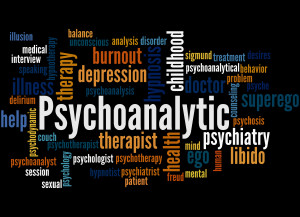 What is the purpose of psychotherapy? Many new patients ask, “How can psychotherapy help? How will talking about my problems make my life better?” The question seems well founded. People often seek psychotherapy when they feel at a loss for what to do about the misery in their lives. They may recognize that their sleep is disrupted or they are gaining weight, preoccupied by distressing thoughts, easily angered or irritated, arguing with their family and friends, and wondering who or what is to blame.
What is the purpose of psychotherapy? Many new patients ask, “How can psychotherapy help? How will talking about my problems make my life better?” The question seems well founded. People often seek psychotherapy when they feel at a loss for what to do about the misery in their lives. They may recognize that their sleep is disrupted or they are gaining weight, preoccupied by distressing thoughts, easily angered or irritated, arguing with their family and friends, and wondering who or what is to blame.
Television commercials for the latest pharmaceuticals inform the public that a person’s misery is likely the result of undiagnosed or unmedicated mental illness. We are shown depressed, manic, and psychotic people miraculously transformed by a new drug that will return them to happy and productive lives (albeit with the legal disclaimer that there may be a host of significant, even fatal, side effects). But the take-away is clear, if you are unhappy in your life you have a medical disease that is victimizing your happiness. Can psychotherapy help? What possible benefit could come from talking to a therapist?
All too often, some therapists see their role as helping people accept their fate as being mentally ill and encouraging them to simply take medications. In fact, not encouraging your patients to take medications might be considered unethical and incompetent. The overriding message from the medical mental health community is that mental illness is a disease, like diabetes, degenerative heart disease, or Alzheimer’s.
The assertion is compelling, but what is the evidence? We now know about the role of neurotransmitters, various brain regions, and genetic correlations that support a physiological basis for our emotional and behavioral experience. This empirical evidence, however, is descriptive not explanatory. We can describe how the physiology of the body creates and influences our mental life, but it doesn’t explain why a person may be miserable. All disorders in the DSM are determined by the appearance, frequency, and intensity of various emotions or actions, i.e. symptoms. Symptoms are signifiers of an illness. Chest pain could be a symptom of a heart attack, a headache could be a symptom of a brain tumor, high blood sugar levels could be a symptom of diabetes, but the symptom is not equivalent to the disease. Further examination is necessary to determine if there is an organ malfunction, a tumor, or some other underlying disturbance. In no case, however, is simple symptom reduction competent or ethical treatment.
Psychiatric diagnoses, by contrast, equate the symptom with the disease, such that the presence of a “symptom” is considered empirical validation of the disorder—a misguided example of circular logic that removes the person of the patient from the equation. Rather than considering the unique circumstances or subjective experience of the person’s life as significant to their emotions and actions, they are replaced by a generic diagnosis.
A teenager who cuts herself at night is said to have a “non-suicidal self-injury disorder;” a middle-aged man who stays up nights watching pornography rather than being with his wife is said to have a “sex-addiction.” These conditions are presented as if they exist independent of the persons who possess them. What is rarely considered is that these people are trying to retain their sanity with solutions that have become an expression of their suffering. What is the teenager trying to release from her body? Who or what imaginary world is the sex-addict trying to find on the internet?
Rather than helping patients understand themselves, modern disease-based treatments aim to substitute the suffering with a generic condition (a diagnosis) that can be medicated. No wonder there appears to be an epidemic of mental illness if nearly every expression of human misery is made to fit into a diagnostic category. Consider that, since the DSM-III (1980), there has been nearly a 100% increase in the number of diagnosable conditions, as compared to the current DSM-5 (2013). (DSM-II had 182 disorders, DSM-III had 265, DSM-IV had 279, DSM-5 has 500).
Can psychotherapy help? Freud introduced the “talking cure” as an alternative to the radical, and sometimes barbaric, treatment of persons who suffered from psychological distress. For over 100 years we have seen the growth of psychotherapeutic treatments evolve into many forms whose effectiveness rivals that of medications. These treatments typically center around the significance of human-to-human relationships that provide acceptance, empathy, and self-empowerment. How can psychotherapy help? Patients are helped to find a voice for their personal truths that expresses how they have come to understand themselves and others and to challenge beliefs that may not be valid. The therapist’s role serves to facilitate that self-expression and to bear witness to truths that may seem unspeakable. The goal is not to be a panacea for the human condition, but rather to help persons develop and sustain the necessary skills to manage life with dignity and humility.
To read about what adolescents say helped them in psychodynamic psychotherapy, see What Works in Psychodynamic Psychotherapy With Adolescents? You may also find the following interesting: Evidence Base for Psychodynamic Psychotherapy With Children and Adolescents. Both sites provide links to free articles.
Interested in earning a Certificate of Advanced Study in Psychoanalytic Psychotherapy? Simply complete 48 CE credits with our psychoanalytic courses, including at least three course courses. Entirely online, accessible 24/7, and paced at your convenience.
 The Institute of Advanced Psychological Studies is approved by the American Psychological Association to sponsor continuing education for psychologists. The Institute of Advanced Psychological Studies maintains responsibility for this program and its content.
The Institute of Advanced Psychological Studies is approved by the American Psychological Association to sponsor continuing education for psychologists. The Institute of Advanced Psychological Studies maintains responsibility for this program and its content.








